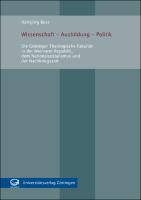Wissenschaft
Ausbildung - Politik - Die Göttinger Theologische Fakultät in der Weimarer Republik, dem Nationalsozialismus und der Nachkriegszeit
| dc.contributor.author | Buss, Hansjörg | |
| dc.date.accessioned | 2022-02-04T04:30:48Z | |
| dc.date.available | 2022-02-04T04:30:48Z | |
| dc.date.issued | 2021 | |
| dc.identifier | OCN: 1300804095 | |
| dc.identifier.isbn | 978-3-86395-527-4 | |
| dc.identifier.uri | https://library.oapen.org/handle/20.500.12657/52665 | |
| dc.description.abstract | "Our Faculty of Theology is really and truly the only Faculty of Theology from which something great and effective in the sense of the new state can be made if the Ministry is determined to rebuild. Dean Emanuel Hirsch to Rector Friedrich Neumann on June 16, 1934On a broad source basis, Hansjörg Buss deals with the theological faculty of the State University of Göttingen in the first half of the 20th century. The significance and influence of the new theological approaches of the interwar period as well as the social and political challenges on institutional action, research, teaching, administration, and journalism are examined, with the situation of the student body also being considered for the first time. It is shown that the faculty at no time found a positive relationship to the Weimar Republic. During the National Socialist dictatorship, the 'church struggle' and ideological competitive pressure from the Nazi state narrowed its scope. Plans to create a German-Christian flagship faculty fell through, hopes and disillusionment, loyalty to the state and opposition to church policy, academic continuity and institutional struggle for existence determined its further path. The collapse of the German Reich in May 1945 ushered in a far greater caesura: The personnel reorganization was connected with a theological reorientation that left a lasting mark on the faculty. The author: Dr. Hansjörg Buss, born in 1971, studied history, political science and law (public law). The present work was made possible by a three-year research fellowship from the Göttingen Faculty of Theology. Translated with www.DeepL.com/Translator (free version) | |
| dc.language | German | |
| dc.subject.classification | thema EDItEUR::Q Philosophy and Religion::QR Religion and beliefs::QRM Christianity::QRMF Christianity: sacred texts and revered writings::QRMF1 Bibles::QRMF13 New Testaments | en_US |
| dc.subject.other | faculty of theology | |
| dc.subject.other | University of Göttingen | |
| dc.subject.other | interwar period | |
| dc.title | Wissenschaft | |
| dc.title.alternative | Ausbildung - Politik - Die Göttinger Theologische Fakultät in der Weimarer Republik, dem Nationalsozialismus und der Nachkriegszeit | |
| dc.type | book | |
| dc.type | book | |
| oapen.relation.isPublishedBy | ffaff15c-73ed-45cd-8be1-56a881b51f62 | |
| oapen.collection | AG Universitätsverlage | |
| oapen.description.otherlanguage | „Unsere Theologische Fakultät ist wirklich und wahrhaftig die einzige Theologische Fakultät, aus der sich bei entschlossenem Neubauwillen des Ministeriums wirklich etwas Großes und Wirksames im Sinne des neuen Staates machen lässt. Wir allein haben dazu hinreichende Ansätze im vorhandenen Bestande.“ Dekan Emanuel Hirsch an Rektor Friedrich Neumann am 16. Juni 1934 Auf breiter Quellenbasis setzt sich Hansjörg Buss mit der Theologischen Fakultät der Landesuniversität Göttingen in der ersten Hälfte des 20. Jahrhunderts auseinander. Untersucht werden Bedeutung und Einfluss der neuen theologischen Ansätze der Zwischenkriegszeit sowie der gesellschaftlichen und politischen Herausforderungen auf institutionelles Handeln, Forschung, Lehre, Verwaltung und Publizistik, wobei erstmals auch die Lage der Studierendenschaft in den Blick genommen wird. Gezeigt wird, dass die Fakultät zu keiner Zeit ein positives Verhältnis zur Weimarer Republik fand. Während der nationalsozialistischen Diktatur engten der ‚Kirchenkampf‘ und weltanschaulicher Konkurrenzdruck durch den NS-Staat ihre Spielräume ein. Pläne zur Schaffung einer deutschchristlichen Vorzeigefakultät zerschlugen sich, Hoffnungen und Desillusionierungen, staatspolitische Loyalität und kirchenpolitische Gegensätze, akademische Kontinuität und institutioneller Existenzkampf bestimmten ihren weiteren Weg. Der Zusammenbruch des Deutschen Reiches im Mai 1945 leitete eine weitaus größere Zäsur ein: Die personelle Neuaufstellung war mit einer theologischen Neuausrichtung verbunden, die die Fakultät nachhaltig prägte. Der Autor: Dr. Hansjörg Buss, geb. 1971, studierte Geschichte, Politische Wissenschaft und Jura (öffentliches Recht). Die vorliegende Arbeit ermöglichte ein dreijähriges Forschungsstipendium der Göttinger Theologischen Fakultät. |

